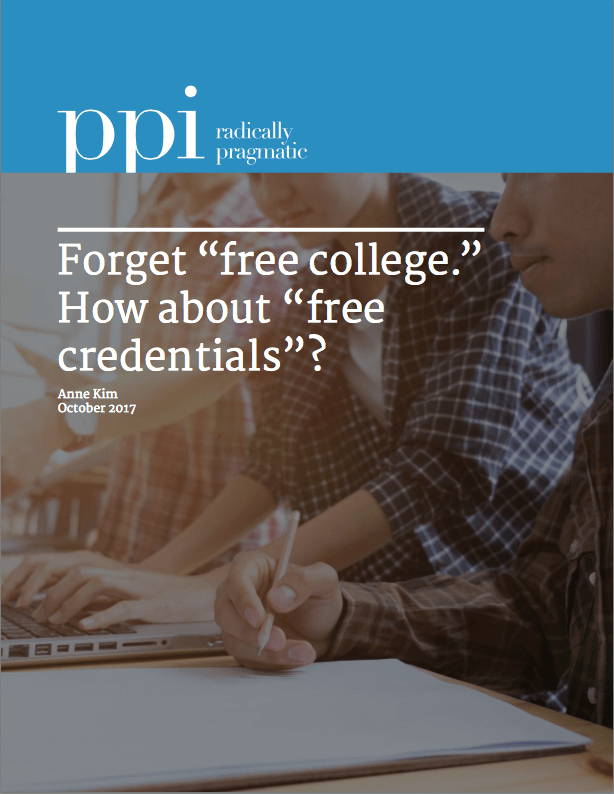Press Release: New PPI Report Offers Pragmatic Alternative to “Free College” Proposal
10.19.2017
Free credentials would help millions of Americans without four-year degrees reach the middle-class debt free & close labor force “skills gap”
WASHINGTON —The Progressive Policy Institute (PPI) today released a new policy report by senior fellow Anne Kim, “Forget ‘free college.’ How about ‘free credentials?,'” proposing greater federal support of high-quality occupational credentialing opportunities as an alternative to a “free” four-year degree. The report finds that federal support of such programs—including the extension of federal Pell grants—would help close the “skills gap” and provide an equally viable and debt-free path to middle-class mobility and economic security.

“The single-minded focus on college diminishes other, equally viable paths to middle-class security – such as in health care, information technology, advanced manufacturing, and other skilled professions – that require specialized occupational ‘credentials’ but no four-year degree,” writes Kim.
“If progressives truly want to expand opportunity, they should reverse the lopsided bias toward college, both in politics and in policy, rather than reinforcing it. In particular, federal and state policymakers should embrace the role that high-quality, short-term credentialing programs can play in boosting workers’ skills and wages.”
Kim argues that current higher education policy is heavily tilted toward a monolithic view of postsecondary education – as a single block of time in the life of a young adult between the ages of 18 and 22 with a four-year degree as the optimal outcome. It’s a framework that fails to acknowledge the needs of both students and employers in today’s rapidly changing economy. And it sends the wrong message to the millions of Americans who opt out of college – not because they can’t afford it but don’t want it or need it to achieve their aspirations. As pollster Pete Brodnitz of Expedition Strategies puts it, insisting on college as the ideal path is “essentially telling people they have the wrong dream.” “A lot of people want jobs that involve trades or skills,” says Brodnitz, “not a liberal arts education.”
The report finds that many of the jobs that require a credential, but no college degree, pay salaries that comfortably put workers into the middle class. Such “middle-skill” jobs can pay as much as $90,420. Importantly, Kim notes, quality credentialing programs can also be a valuable postsecondary alternative for older and nontraditional students for whom a commitment to full-time or part-time coursework in a traditional college setting may be unrealistic, impractical, or unnecessary. And because they typically take weeks or months to earn, not years, credentials can help workers who’ve been displaced rapidly redeploy themselves into new careers with demonstrated employer demand.
###





